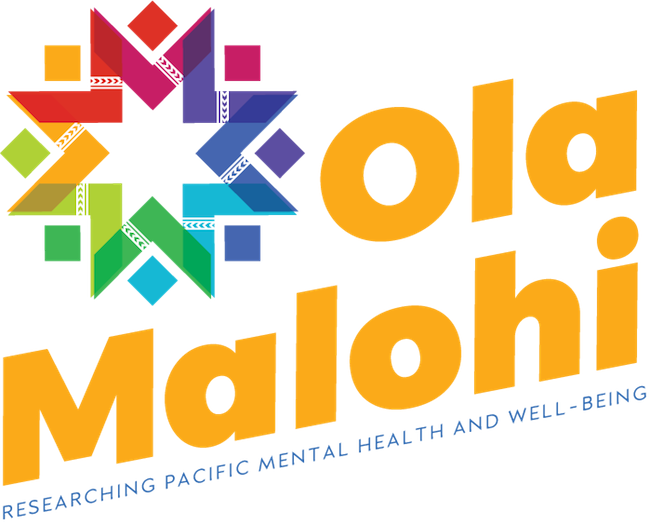
An exciting three-year Pacific study
In 2019 all first-year students who identified as Pacificand in their first year of study at the University of Otago, were invited to participate in the Ola Malohi study. The term Ola Malohi comes from the Tokelauan language and means 'well-being' or 'living well'.
What is involved?
Participants complete one 20-minute online survey each semester over three years (2019–2021). The first survey opened in April 2019. The follow-up survey took place in August-September 2019. In total 144 Pacific first-year students joined the Ola Malohi community. Additionally 30 of these students took part in meaningful face-to-face talanoa conversations about their experiences at university on two occasion in 2019. They will continue these conversations once in 2020, and for the final time in 2021.
Five participants won one of five $100 vouchers for taking part in the first survey. All participants who took part in the second survey and future surveys receive a $5 pizza e-voucher. The 30 participants who take part in the talanoa conversations will receive a small gift for each conversation ($20 value).
How will it help?
By sharing their views and experiences, participants ensure that their voice is heard and they will help shape the support services offered to Pacific students at the University of Otago.
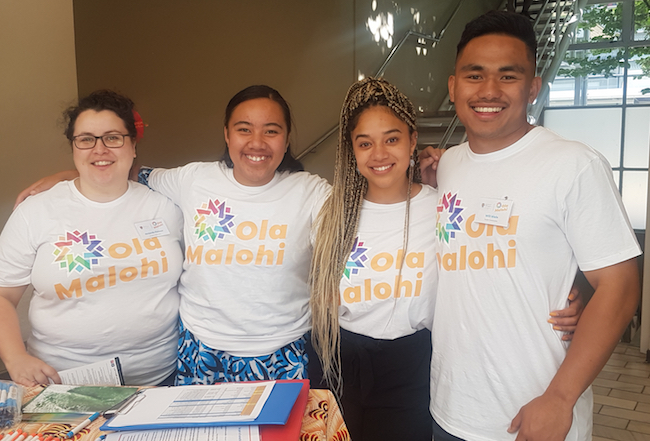
Four of our Ola Malohi student ambassadors, from left: Octavia Palmer, Rhonda Tomasi, Fuatino Heath, and Will Siale.
About the research
The Ola Malohi study into Pacific students' mental health and well-being at Otago University went live for the first time during April2019. The third round of surveys went live at the end of April 2020 during the COVID-19 lockdown.
The Ola Malohi research project is funded by the Health Research Council of New Zealand and is led by Faumuina Professor Tai Sopoaga, head of Va'a o Tautai. This ground-breaking research involves following the journey of first-year University of Otago Pacific students from across the University for three years, with the aim of better understanding their mental health and well-being, experiences, successes and challenges. By sharing their experiences at the University, students will provide invaluable insights to help improve health and educational outcomes for Pacific students.
The research group is extremely grateful for the involvement and consultation of the Pacific Technical Advisory Group and the Pacific Student Advisory Group, as well as the enthusiasm and encouragement of the Ola Malohi Student Ambassadors. We also acknowledge the contribution of Assistant Research Fellows Albany Lucas and Sellina Sa'u who were involved with survey development and talanoa conversations respectively. Our deepest thanks are also extended to Raymond Jones for his REDCap support and Eric Nabalagi for his assistance with recruitment and retention of participants.
What do we know so far?
Preliminary findings from the first survey were shared with heads of colleges, advisory groups and with participants at an end of year celebratory barbecue.
If you have any questions, now or in the future please feel free to contact:
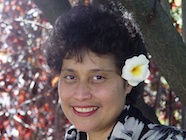 Faumuina Fa'afetai Sopoaga
Faumuina Fa'afetai Sopoaga
Professor
Va'a o Tautai
Tel +64 3 479 8493
pacific.health@otago.ac.nz
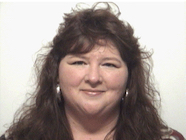 Tracie LeckieProject Manager
Tracie LeckieProject Manager
Assistant Research Fellow
Va'a o Tautai
ola.malohi@otago.ac.nz
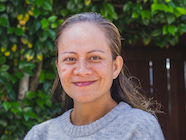 Sina Mualia
Sina Mualia
Assistant Research Fellow
Va'a o Tautai
ola.malohi@otago.ac.nz
This study has been approved by the University of Otago Human Ethics Committee (Health). If you have any concerns about the ethical conduct of the research you may contact the Committee through the Human Ethics Committee Administrator. Any issues you raise will be treated in confidence and investigated and you will be informed of the outcome.
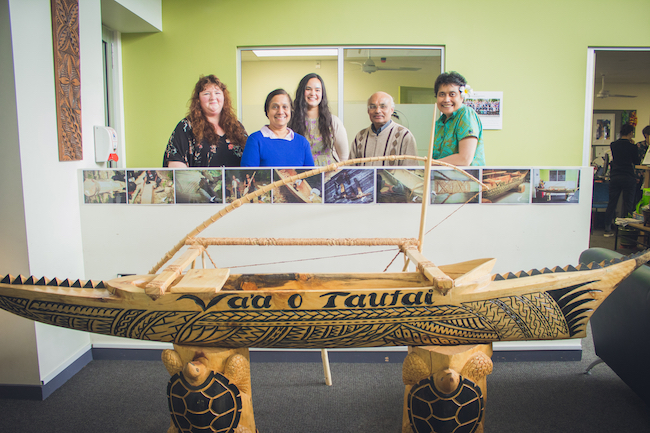
The Ola Malohi research team from left: Tracie Leckie (Project Manager, ARF), Dr Shyamala Nada-Raja (Senior Research Fellow), Albany Lucas (ARF), Dr Ari Samaranayaka (Biostatistician), Faumuina Professor Fa'afetai Sopoaga (Primary investigator).
Need to talk?
If you are feeling down, sad, worried or just not feeling like yourself reach out and talk to a trusted friend, family or whānau member – sharing your problems or feelings with others does help. If you are in a college, your Residential Assistant (RA), sub-warden or senior tutor is often a good person to talk to. If you feel like you need more specialised advice or support, please make contact with one of the services or support agencies listed below. Your mental health and well-being truly matters!
Below is a list of support services that are offered both on and off campus for a range of issues.
You can also contact us at ola.malohi@otago.ac.nz if you would like any further information that might be helpful to you.
Emergency? Call 111
If you or someone you love is feeling unsafe or in an emergency situation, call 111 immediately. Don't wait.
Services and support from within the University of Otago
In the first instance, we would suggest that you contact Student Health Services or your primary care provider (e.g. General Practitioner).
- Student Health Services or call 0800 479 821 (including cellphones)
- Head/Deputy Head/Residential Assistants at your College
- Pacific Islands Centre or call +64 3 479 8278 (reception)
- Pacific Islands Research and Student Support Unit (PIRSSU) website or call +64 3 471 6360
- Chaplains
- Māori Centre or call +64 3 479 8490
- Disability Information and Support or call +64 3 3 479 8235
- Student Learning Development or call +64 3 479 8801
- Proctor and Campus Watch or call Campus Watch 0800 479 5000; Campus Cop +64 3 479 4883
- Students' Association or call +64 3 479 5332
National services and support outside of the University of Otago
HEALTHLINE (Ministry of Health) 0800 611 116 – 24 hour a day access to advice and health related information provided by registered health professionals
https://www.health.govt.nz/your-health/services-and-support/health-care-services/healthline
COVID-19 helpline - 0800 358 5453
1737 Helpline Phone or text 1737 for 24-hour a day access to mental health professionals.
https://1737.org.nz/
Melon – an app that provides users with a health journal, resources and self-awareness tools to help people manage their mental wellbeing. Through Melon, users are able to connect with a wider online community within New Zealand enabling them to support each other. Webinars will also be available for health and well-being. Additional resources that cater specifically to the 13 to 24-year-old age group will be added.
https://www.melonhealth.com/covid-19/
Staying on Track is an e-therapy tool designed to help people who are experiencing worry and distress. Its cognitive behaviour therapy (CBT) teaches practical strategies to cope with the stress and disruption to everyday life. (will be up mid-late April)
https://www.beehive.govt.nz/release/justathought.co.nz/covid19
Other mental health and well-being support helplines and apps
Aunty Dee is a Pasifika-friendly web-based tool to help you work through your problems.
https://www.auntydee.co.nz/
What's Up? Call 0800 942 8787 (12pm-11pm) or chat online (3pm-10pm). The What's Up service offers assistance over the phone and provides a website with advice on a variety of teenage issues for young people aged up to 18 years.
https://www.whatsup.co.nz/
Youthline call 0800 376 633
Youthline is a free 24/7 helpline service. www.youthline.co.nz | Text 234 | Webchat via Email talk@youthline.co.nz
Depression Helpline call 0800 111 757
Call Depression Helpline if you are feeling down and would like to talk to a trained counsellor.
OUTLine NZ call 0800 688 5463
OUTLine NZ provides support for sexuality or gender identity issues.